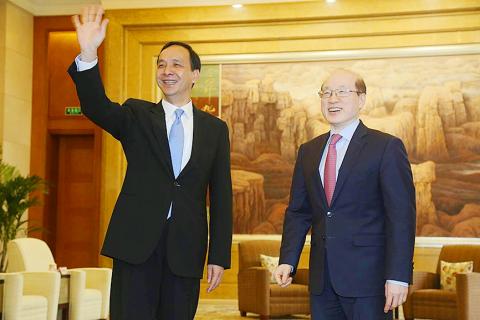New Taipei City Mayor Eric Chu (朱立倫) and China’s Taiwan Affairs Office Minister Liu Jieyi (劉結一) yesterday reiterated the so-called “1992 consensus” as a basis for cross-strait relations as they met in Shanghai.
Chu is the first Taiwanese politician to meet Liu since the Chinese Communist Party’s (CCP) Central Committee announced the former UN ambassador’s appointment earlier this month.
Insistence on the “1992 consensus” has been the consistent position of the Chinese Nationalist Party (KMT), Chu said.

Photo courtesy of New Taipei City Government
Even though the KMT is now the opposition party, this stance would not change, and it hopes that the two sides of the Taiwan Strait can engage in peaceful exchanges and achieve win-win cooperation, Chu said.
Although the political circumstances have changed, what people hope for most is peace, he said.
Local-level exchanges must also continue, as the two sides could learn about city governance from each other, he said.
Beijing insists on the “1992 consensus,” which reflects the “one China” principle and opposes Taiwanese independence schemes in any form, Liu said.
“The mainland’s policies toward Taiwan are to continue to uphold the ‘two sides of the Strait, one family’ ideology,” he said.
China hopes the two sides can work together for the peaceful development of relations and “jointly promote the process of the peaceful reunification of the motherland,” Chinese state media quoted Liu telling Chu.
The “1992 consensus” — a term former Mainland Affairs Council chairman Su Chi (蘇起) said in 2006 that he had made up in 2000 — refers to a tacit understanding between the KMT and the CCP that the two sides acknowledge there is “one China,” with each side having its own interpretation of what “China” means.
In Taipei, the Mainland Affairs Council said the government holds a positive attitude toward city-level cross-strait exchanges, but they must be handled according to relevant guidelines.
Attention must be paid to reciprocal respect, while issues pertaining to public power fall within the authority of the central government and no agreements are to be signed, it added.
The New Taipei City Government should remember to follow the relevant guidelines when it engages in cross-strait exchanges with other cities, the council said.
China should not set a one-sided political framework to limit cross-strait exchanges, it added.
In related developments, the Ministry of National Defense (MND) said several Chinese military aircraft were spotted flying over the Bashi Channel yesterday as part of a long-range flight training mission in the western Pacific.
The aircraft included Su-30s, Shaanxi Y-8 transport planes and Xian H-6 bombers, which all returned to their bases in China on the same route, the ministry said.
It said it had scrambled aircraft to shadow the Chinese planes until they returned to their bases.
The military is maintaining a close watch on Chinese military movements and the necessary measures to ensure national security, the ministry added.
Additional reporting by CNA and Reuters

ENDEAVOR MANTA: The ship is programmed to automatically return to its designated home port and would self-destruct if seized by another party The Endeavor Manta, Taiwan’s first military-specification uncrewed surface vehicle (USV) tailor-made to operate in the Taiwan Strait in a bid to bolster the nation’s asymmetric combat capabilities made its first appearance at Kaohsiung’s Singda Harbor yesterday. Taking inspiration from Ukraine’s navy, which is using USVs to force Russia’s Black Sea fleet to take shelter within its own ports, CSBC Taiwan (台灣國際造船) established a research and development unit on USVs last year, CSBC chairman Huang Cheng-hung (黃正弘) said. With the exception of the satellite guidance system and the outboard motors — which were purchased from foreign companies that were not affiliated with Chinese-funded

PERMIT REVOKED: The influencer at a news conference said the National Immigration Agency was infringing on human rights and persecuting Chinese spouses Chinese influencer “Yaya in Taiwan” (亞亞在台灣) yesterday evening voluntarily left Taiwan, despite saying yesterday morning that she had “no intention” of leaving after her residence permit was revoked over her comments on Taiwan being “unified” with China by military force. The Ministry of the Interior yesterday had said that it could forcibly deport the influencer at midnight, but was considering taking a more flexible approach and beginning procedures this morning. The influencer, whose given name is Liu Zhenya (劉振亞), departed on a 8:45pm flight from Taipei International Airport (Songshan airport) to Fuzhou, China. Liu held a news conference at the airport at 7pm,

Taiwan was ranked the fourth-safest country in the world with a score of 82.9, trailing only Andorra, the United Arab Emirates and Qatar in Numbeo’s Safety Index by Country report. Taiwan’s score improved by 0.1 points compared with last year’s mid-year report, which had Taiwan fourth with a score of 82.8. However, both scores were lower than in last year’s first review, when Taiwan scored 83.3, and are a long way from when Taiwan was named the second-safest country in the world in 2021, scoring 84.8. Taiwan ranked higher than Singapore in ninth with a score of 77.4 and Japan in 10th with

GRIDLOCK: The National Fire Agency’s Special Search and Rescue team is on standby to travel to the countries to help out with the rescue effort A powerful earthquake rocked Myanmar and neighboring Thailand yesterday, killing at least three people in Bangkok and burying dozens when a high-rise building under construction collapsed. Footage shared on social media from Myanmar’s second-largest city showed widespread destruction, raising fears that many were trapped under the rubble or killed. The magnitude 7.7 earthquake, with an epicenter near Mandalay in Myanmar, struck at midday and was followed by a strong magnitude 6.4 aftershock. The extent of death, injury and destruction — especially in Myanmar, which is embroiled in a civil war and where information is tightly controlled at the best of times —